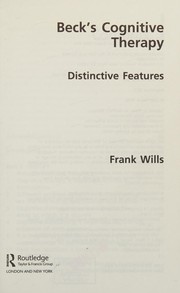Check nearby libraries
Buy this book

This edition doesn't have a description yet. Can you add one?
Check nearby libraries
Buy this book

Previews available in: English
Subjects
Cognitive therapy, Cognitive Therapy, Psychoanalytic Theory, Psychoanalysis, Cognitive Behavioral Therapy, Thérapie cognitive, Psychanalyse, HEALTH & FITNESS, Diseases, General, MEDICAL, Clinical Medicine, Evidence-Based Medicine, Internal Medicine, Psychotherapie, Kognition, Cognitieve therapiePeople
Aaron T. BeckShowing 1 featured edition. View all 1 editions?
| Edition | Availability |
|---|---|
|
1
Beck's cognitive therapy: distinctive features
2009, Routledge
in English
- 1st ed.
0415439515 9780415439510
|
aaaa
Libraries near you:
WorldCat
|
Book Details
Table of Contents
Beck's life in brief
Part I: Theory
Prelude: Beck and his group
Cognitive therapy is organised around a formulation
Different problem areas are marked by specific cognitive themes
Cognitive therapy varies according to the areas to which it is applied
Cognitive functioning is organised around the existence of deep schemas
It is helpful to understand the evolutionary underpinnings of many psychological problems
Beck describes a variety of levels and types of cognition
Cognitive distortions play a key role in emotional problems but not irrational
Images also contain key and distorted cognitions
Cognitions, emotion, and behaviour interact with mutual and reciprocal influence on each other
Safety behaviours, including avoidance, reassurance seeking and hyper-
Vigilance play a crucial role in maintaining anxiety
Strategies that address negative attention bias strengthen the cognitive
Therapy model
Meta-cognition : the way people think about thinking also influences the way they feel and behave
Promoting mindfulness and mindful attention to negative thoughts is likely to form a major part of cognitive therapy in future
Beckian epistemology has a clear process for developing appropriate
Therapeutic knowledge for cognitive therapists to follow
Cognitive therapy is strengthened by protocol development and the specification of cognitive therapy skills
Part II: Practice
Using formulation to focus work
Using formulation to tackle interpersonal & alliance issues
CT requires a sound therapeutic relationship
The relationship in CT requires collaboration
Cognitive therapy is brief and time-limited
Cognitive therapy is structured and directional
Cognitive therapy is problem and goal oriented
Cognitive therapy initially emphasises a present time focus
Cognitive therapy uses an educational model
Homework is a central feature of cognitive therapy
Ct teaches clients to evaluate and modify their thoughts
CT uses various methods to change cognitive content
CT uses various methods to change cognitive processes
CT uses various methods to change behaviour
Assessing and developing competence in CT skills.
Edition Notes
Includes bibliographical references and index.
Classifications
The Physical Object
ID Numbers
Community Reviews (0)
Feedback?| December 15, 2022 | Edited by MARC Bot | import existing book |
| August 27, 2022 | Edited by ImportBot | import existing book |
| December 20, 2020 | Edited by MARC Bot | import existing book |
| April 16, 2010 | Edited by WorkBot | update details |
| December 10, 2009 | Created by WorkBot | add works page |









